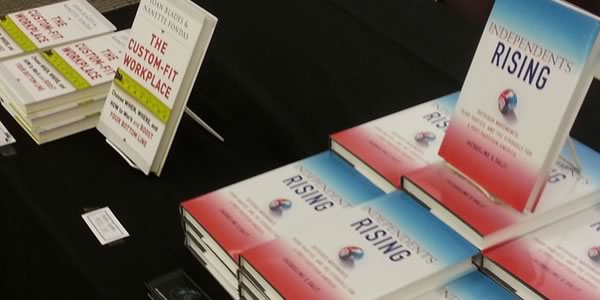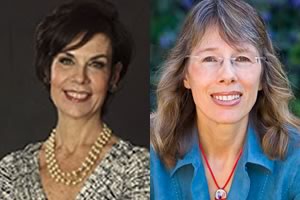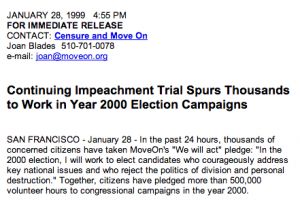Living Room Conversations and Changing the Political Culture

 Joan Blades, founder of MomsRising.org, and guest speaker Jackie Salit, author of Independents Rising, hosted an event in San Francisco on Saturday to discuss a new political culture in America; one focused on understanding different perspectives. Salit opened the discussion with a light-hearted memory of the barriers she faced at a young age. "I don't remember ever becoming an activist, but grew up in a very political family." But she did remember bringing a bunch of kids together in her neighborhood to talk about her concern for the fighting and factionalism among them. She also remembered that "no one would play with me after that," which drew some laughter from the audience of about 100.
Joan Blades, founder of MomsRising.org, and guest speaker Jackie Salit, author of Independents Rising, hosted an event in San Francisco on Saturday to discuss a new political culture in America; one focused on understanding different perspectives. Salit opened the discussion with a light-hearted memory of the barriers she faced at a young age. "I don't remember ever becoming an activist, but grew up in a very political family." But she did remember bringing a bunch of kids together in her neighborhood to talk about her concern for the fighting and factionalism among them. She also remembered that "no one would play with me after that," which drew some laughter from the audience of about 100.

Salit continued by discussing the need for process-oriented changes to the political system in order to break the partisan divide, the result of a political culture that has embraced the same mentality of school-yard children; one that has created massive institutional barriers to cooperative participation in the process. She argued that the only way to get over the massive hurdles that prevent cooperation requires a fundamental change in our political process.
Joan Blades began her discussion with the qualification that she never expected to get involved in politics. She felt compelled to get involved during Clinton's presidency when she said the call for his impeachment was used as a political tactic to the detriment of the country and our political dialogue. She co-founded MoveOn.org shortly thereafter, "so we could all just move on and start talking about issues." From there, she launched the "We Will Remember" campaign, a petition drive which was meant to unify people across party lines who vowed to vote for candidates based on issues, and not party.
The original mission of MoveOn.org was to listen to voters and push for what voters wanted. Blades made short mention of what MoveOn has become, instead alluding to the institutional devolution of the political dialogue to which the political parties, the media, and well-recognized political organizations have all succumb.
Original MoveOn Press Release from 1999Salit emphasized the importance of changing the culture, before we as a country can create meaningful political change. "It is important to identify or think about what we mean by culture-change. I think what culture change is right now, at this time in America ... is about people organizing and creating environments which make it possible for them to grow. We don't have those environments now. We need to create the conditions first that enable us to do the things we need to do."
"We have to figure out how to do collaborative problem solving," added Blades. "The culture in Washington is that they can't even communicate. Research shows, facts don't convince people. Before they can even hear you, you have to have a connection. When you get to the grassroots, the people on all sides are good people. There is real substance there. And that is when facts can be effective."
Salit also discussed California's newest change in the electoral process; the non-partisan open primary. "You make this change, it levels the playing field, and as soon as it happens, the players are already trying to take the system back, trying to game the new system..."
Joan Blade's newest project aimed at elevating the civil discourse.Without a change in culture, Blades agreed that the institutional players will take the system back. That is why she started a pilot project called Living Room Conversations in 2010. The conversations are designed to revitalize the art of conversation among people with diverse views and promote a civil discourse among our neighbors. To spur the conversations, two hosts of different political leanings each invite two of their friends or family members to join an evening of conversation. What they have discovered is that people not only learn, but have found the conversations to be meaningful and even transformational in breaking down predispositions to not listen to "the other side or the conversation."
Particularly interesting was the response from Blades and Salit to a question from a young academic attendee who asked about the media's role in changing the political culture.
"The media has lost their moral underpinnings. I don't know if we go back to the days when we required stations to give bandwidth ... that was a disaster," said Blades. Salit added:"Sometimes I ruminate about it. Sometimes I decide I am not going to worry about it. When it gets big enough, the media will cover us because they will have to. If it weren't for independent voters, Hillary Clinton would be President. This is a political force that even as unorganized as it is has had a significant impact on the political system. Ultimately, I've come to the conclusion that I won't worry about it because I worry about us, our capacity, and the ability to tell our story. They will come along when they decide it's in their interest."
While independents can be found across the political spectrum, Salit commented on a common trope that brings them together; the unequal access to the political process: "What this independent movement is about is creating a voice so people can participate."
 Chad Peace
Chad Peace




